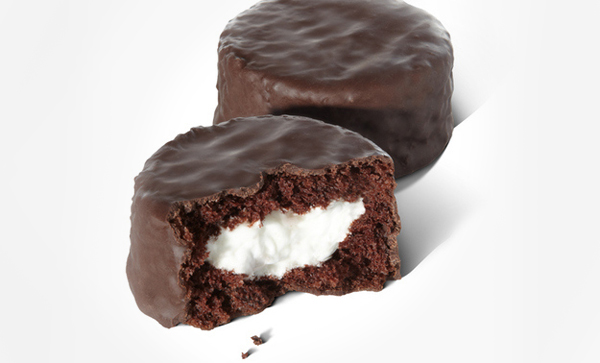Ding Dong, RIP
 Photo via Hostess
Photo via Hostess
In fourth grade at Damascus Elementary School, everyone had their own way of eating a Ding Dong, and mine was this: I would bite the chocolate frosting from the sides, like a beaver mawing the bark off a log. Then I would peel the two circular sheets of frosting from top and bottom to get to the soft chocolate sponge cake and its delectable white frosting center. I’d savor each bite, licking the chocolate from my fingers even as Mr. Belanardo commanded us to bring our empty lunch boxes back to the coat closet and line up for recess.
When word came on Friday that Hostess was liquidating after several troubled years, I felt a pang of sadness. Like a lot of people who grew up eating Twinkies, Ho Hos, Funny Bones, and hot pink Sno Balls, I saw in the confectioner’s demise another bit of my youth gone.
I wasn’t alone. I read status updates about people making mad dashes to the grocery store for one last bite. Some turned to eBay and Craigslist, where a box of Twinkies was said to be going for $50. Twitter blew up with such agony and outrage that you’d have thought Laverne and Shirley had died.
Many pointed out that the truly sad part of the bankrupt Hostess story was that the 18,000 people who lost their jobs are going to have a hard time finding new ones in a tough economy. And they were right. And yet, we couldn’t help ourselves. We are not a people who like to be told we can’t have something. In these modern, Internet-driven times, we’re used to gaining easy access to parts of our past, via eBay, YouTube, or that old stalwart, Google. There are no seventies trivia questions that can’t be answered, no obscure songs that can’t be listened to, no boxes of Twinkies that can’t be found and, for some outrageous fee, dropped the next day on your doorstep.
But what does such instant connection to the past do to mystery, nostalgia, and the imagination? I can’t help but think that some crucial part of us is lost when we can’t really lose things. As a parent, I often wonder what it will be like for today’s kids to grow up and find that nearly every breath they took in their youth was captured digitally, every second of every recital taped, every milestone and tender moment blogged about and Facebook status updated. When they’re older, will they ever have to work to remember something from their past? Will they ever have the satisfaction of using their imaginations to fill in the gaps where memory fails?
I didn’t run out to the store to buy the last boxes of Twinkies, or force my kids to try their first Ding Dong before it was too late. It was too late, for me anyway, a long time ago. “You can’t go home again,” the novelist Thomas Wolfe once famously wrote. And anyone who’s ever driven by their childhood home only to be stunned by how small it is knows just what he meant.
Which is why I chose to leave my favorite Hostess confection where I’ve kept it all these years—not in my kitchen pantry or at the tip of my mind, but tucked away in my aluminum Charlie’s Angels lunchbox in the closet above the hook bearing my name at the back of Mr. Belanardo’s fourth grade class. If I close my eyes I can still see it—perfectly wrapped in shiny silver foil, forever waiting for me to come and open it.


